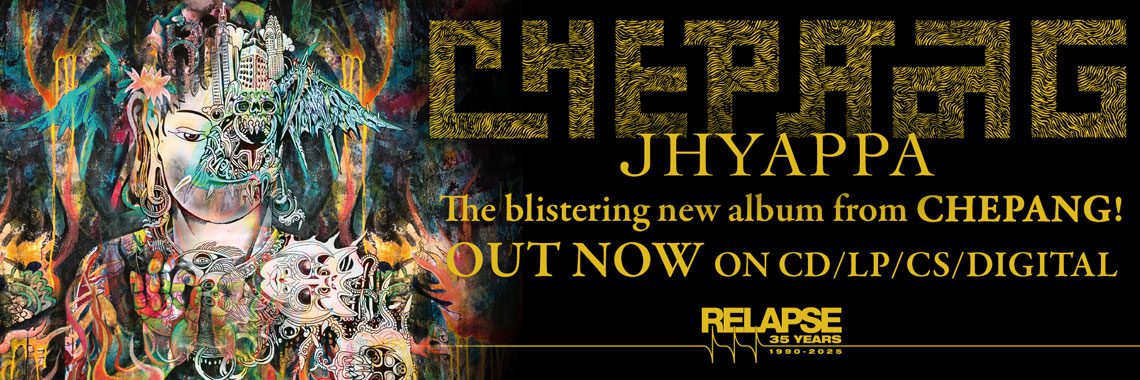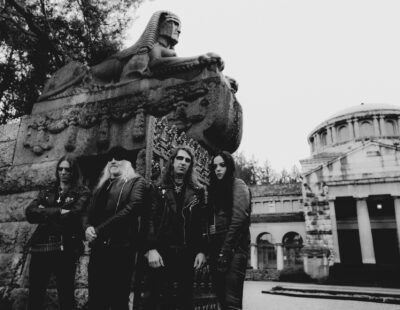
When Sabbath Assembly‘s first album Restored To One was released five years ago it was accompanied by a sense of intrigue missing in most heavy music. What set the band apart was their embrace of the Process Church Of The Final Judgment, a 60s religious cult that suggested that the universe is equally ruled by Satan and God and both should be honored. As the band grew and added both vocalist Jamie Myers (Hammers Of Misfortune) and virtuoso guitarist Kevin Hufnagel they found that the Process Church no longer fit their music. Their self-titled album last year shed all references to the church and their album in the works Rites Of Passage looks to be an even bigger departure. We talked to band founder David Nuss and Myers about Sabbath Assembly’s reinvention and the importance of tribe and tradition.
Sabbath Assembly will be doing a limited tour of the West Coast in late July. Dates follow below. We are teaming with the band to give away two tickets to a show in one of the cities as well as a shirt. Please send us a paragraph telling us where you live and why you should go to [email protected] by July 24, 2016.
At what point was a decision made to move away from the Process Church material and become a working band mining your own ideas?
Dave Nuss: Thematically, it just ran dry. The Process Church has about 60 hymns and they are pretty similar. After (second album) Ye Are Gods both Jamie and I were getting creatively restless. We wanted to move away from that 60s cult sentiment which is a bit of a one-trick pony and get into our own stuff.
Jamie Myers: We’re both creative people and once a well runs dry you have to look elsewhere. We felt like those ideas had been explored so why stifle ourselves.
Was it like starting a band over in the sense that you were working in an established framework and now you have to do your own thing? How did you reinvent yourselves?
JM: It was gradually happening all along even if people didn’t realize it. People took those earlier albums at face value when in reality there were some original compositions on each of them. For us, it wasn’t that big of a transition because we were already doing it.
DN: Quaternity was a transitional album because half of the tunes on that were our own songs created within a Process framework. They have a repetitive theme. Our idea was let’s take the Process themes and we’ll write our own songs reflecting on them. So it’s still Process themes but with our own music and words. We came out of that knowing we had good originals that we can take forward.
Another thing about reimagining the band is you have all of these different talents like Kevin so why not let them rip in an uncontrolled environment?
DN: We’ve been working on our new record. This time, no songs were written beforehand. We just got into a room to see who had a riff. I think people will be very surprised by the new material. It came from a super uncontrolled place. All five of us have a huge emotional investment in the project whereas in the past Jamie had a revolving cast of talent that could come and go. Now, everyone is intrinsically involved.
JM: Being intimately involved as an actual band has opened us up to a lot of emotion and a lot of sincerity that I didn’t know was missing.
Did you also feel like you had outgrown the whole Process Church worldview and it didn’t interest you anymore?
JM: It was very intriguing. I knew about the Process Church before the band even existed and I liked exploring it. But it only held my interest for so long. After Quaternity I felt like we were doing so much with Kevin that was more stimulating and rewarding.
DN: I’m sure you’ve had this happen when you’ve interviewed your heroes. A myth is created when you only have a little bit of information. When you get a lot of information about something and learn about the actors you learn they are just people. When things come out of the shadows you are able to move past them. That happened with me and the Process Church. It was cool when I didn’t know much about it, before the Internet. But then you read about it and find out they are just human. It’s not a childlike admiration based on mystery.
One of the things I liked about Sabbath Assembly is that you were able to build this otherworldly aura or mystique. That is so hard to do when anyone with a computer can figure out you have a day job and a pet.
JM: It’s a different day and age entirely. When we were young and listening to Slayer or Iron Maiden and would look at the album it was kind of scary. Now with two keystrokes you can find out someone’s entire history. If you are trying to be mysterious you have to try a little bit harder.
DN: It’s an interesting point, and something I get fatigued by. Should I have two different Facebook pages? I can’t have work people look at my music stuff and I can’t have music people see the work stuff. And I don’t want my parents to see anything! It’s so hard to navigate the world we’re in. Like Jamie said it was so much easier with one iconic band photo and one album cover. You could go onstage and have the persona you wanted. Is it better when Tom Araya does interviews and sounds like your favorite uncle? I kind of wish I didn’t know that about him.
Are you playing with any ideas or themes with the new material?
DN: The new record is already written so on this tour we are playing half old songs and half new songs that we want to try out. The album is called Rites Of Passage and each song will deal with a different rite of passage. It will be recorded in August after the tour.
Is the album looking at life from birth to death?
DN: That says it very well. Jamie and I are raising kids. My daughter is turning 18 and I’ve seen her as an infant and an individuated human. I could write a symphony based on it. A lot of it comes from my own reflections on parenting and watching the aging of my parents. It’s very moving and emotional and great material to draw on.
JM: We all tend to reflect on our own lives. Everyone as an individual experiences their own rites of passage. But listening to something can really put you in that history. When I hear lyrics and I imagine it’s about my life that’s what excites me. So there’s going to be a lot about family and growing up and the trials and tribulations of life.
DN: Plus, Kevin told me to stop writing about Satan (laughs). He literally said can we not do Satan or have it sound like church-type stuff?
It’s interesting that you mention rites of passage. I read a book called Tribe by Sebastian Junger recently and one of the ideas behind it is that our culture lacks tradition and tribe and it’s making us sick as a people. We don’t do a good job getting people through these challenges or affirming that their life is meaningful.
JM: I talk to friends about that all the time. Not to get all family values here but traditions are important and teach you where you come from. It’s no wonder that the younger generation is going off the rails. A lot of younger people don’t have that. Never mind just having a stable family. If you don’t have someone in your family minding that what are you tied to? Who are you except an Internet page?
DN: It’s true – the world is like a hall of mirrors. You create these things that reflect on each other and then vanish. There are no roots. I’ve seen my own child suffer from growing up in that milieu. It’s like, man, maybe my evangelical Christian upbringing wasn’t that bad because I at least had something.
If you look around you at this echo chamber of violence online no one is trying to figure out what it means and what we can do rather than scream their point of view at someone else.
JM: I live in Fort Worth close to Dallas. To have it (the shooting of five police offers) happen where I spent my formative years is sad. There does seem to be no compromise or willingness to hear the other side. It becomes whoever can speak the loudest wins.
DN: I’ve heard that things are going to be like the new sixties, that maybe we can come through to the other side. One thing I am curious to see is if we can at least get the pop garbage off the radio and get protest music going again. Or maybe this is already happening and I’m not hip to it.
SABBATH ASSEMBLY JULY TOUR:
25 – Seattle, WA – The Highline
26 – Olympia, WA – Obsidian
27 – Portland, OR – The Panic Room
28 – Sacramento, CA – Starlite
29 – Los Angeles, CA – Complex
30 – Oakland, CA – First Church Of The Buzzard






